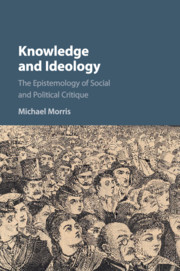Book contents
- Frontmatter
- Dedication
- Contents
- Acknowledgments
- Introduction
- Part I The Dialectic of Ideology
- Part II On Ideology and Violence
- 3 Jean Jacques Rousseau: Economic Oppression, the Gaze of the Other, and the Allure of Naturalized Violence
- 4 Max Stirner: The Bohemian Left and the Violent Self- loathing of the Bourgeoisie
- 5 Marx Contra Stirner: The Parting of Ways
- Part III A Marxist Theory of Knowledge
- Bibliography
- Index
5 - Marx Contra Stirner: The Parting of Ways
from Part II - On Ideology and Violence
Published online by Cambridge University Press: 17 November 2016
- Frontmatter
- Dedication
- Contents
- Acknowledgments
- Introduction
- Part I The Dialectic of Ideology
- Part II On Ideology and Violence
- 3 Jean Jacques Rousseau: Economic Oppression, the Gaze of the Other, and the Allure of Naturalized Violence
- 4 Max Stirner: The Bohemian Left and the Violent Self- loathing of the Bourgeoisie
- 5 Marx Contra Stirner: The Parting of Ways
- Part III A Marxist Theory of Knowledge
- Bibliography
- Index
Summary
An Existential Analysis of Marxism
Any potential exchange between Stirner and Marx must depend largely upon their respective deployment of similar but divergent argumentative strategies, both of which build upon Hegel's dialectic and anticipate Freud's psychoanalysis. In criticizing a broad range of intellectual projects, both Stirner and Marx seek to interpret these projects as necessarily distorted expressions of underlying practical aims. According to Stirner's view, which we might call “existential analysis,” all previous philosophies and political theories represent bad faith attempts to evade the chaos of the body and the eruptive nothingness that grounds human action. By contrast, the socioanalytic method developed by Marx interprets previous philosophies and political theories as more or less distorted attempts to facilitate a broad range of socially constituted aims. In both cases, these critical methods serve a negative and a positive epistemic function. While undermining alternative theories of society and selfhood, they simultaneously reveal, illustrate, and justify the social or psychic models respectively favored by Marx and Stirner.
We find the origins of this common method in Feuerbach's modification of Hegel's dialectical conception of the self. For Hegel, mind or self is an ongoing process of externalization, alienation, and reconciliation. Self or mind first transforms the objective or material world as an expression of its still incipient self. Construed as the formation of the natural world into a social and human domain, this act of externalization is a process of realization, a process of self-discovery, where mind becomes for itself what it once was in itself. In other words, what the mind or self is in itself only becomes evident when it expresses itself in an objective world that is initially other to it. However, due to subjective preconceptions and the recalcitrant nature of the material world, the self fails to recognize itself in the world it creates. This then leads to a complex process of reconciliation, where the self variously transforms its self-conceptions and its objective manifestations, bringing them into closer alignment. Through externalization, alienation, and reconciliation, the self comes to learn what it has always been, though previously in an opaque and deficient form.
Feuerbach adopts Hegel's basic model of selfhood or subjectivity. In the Essence of Christianity, he insists: “The human being is nothing without an object.” And: “In the object, the self becomes aware of itself.
- Type
- Chapter
- Information
- Knowledge and IdeologyThe Epistemology of Social and Political Critique, pp. 161 - 178Publisher: Cambridge University PressPrint publication year: 2016

